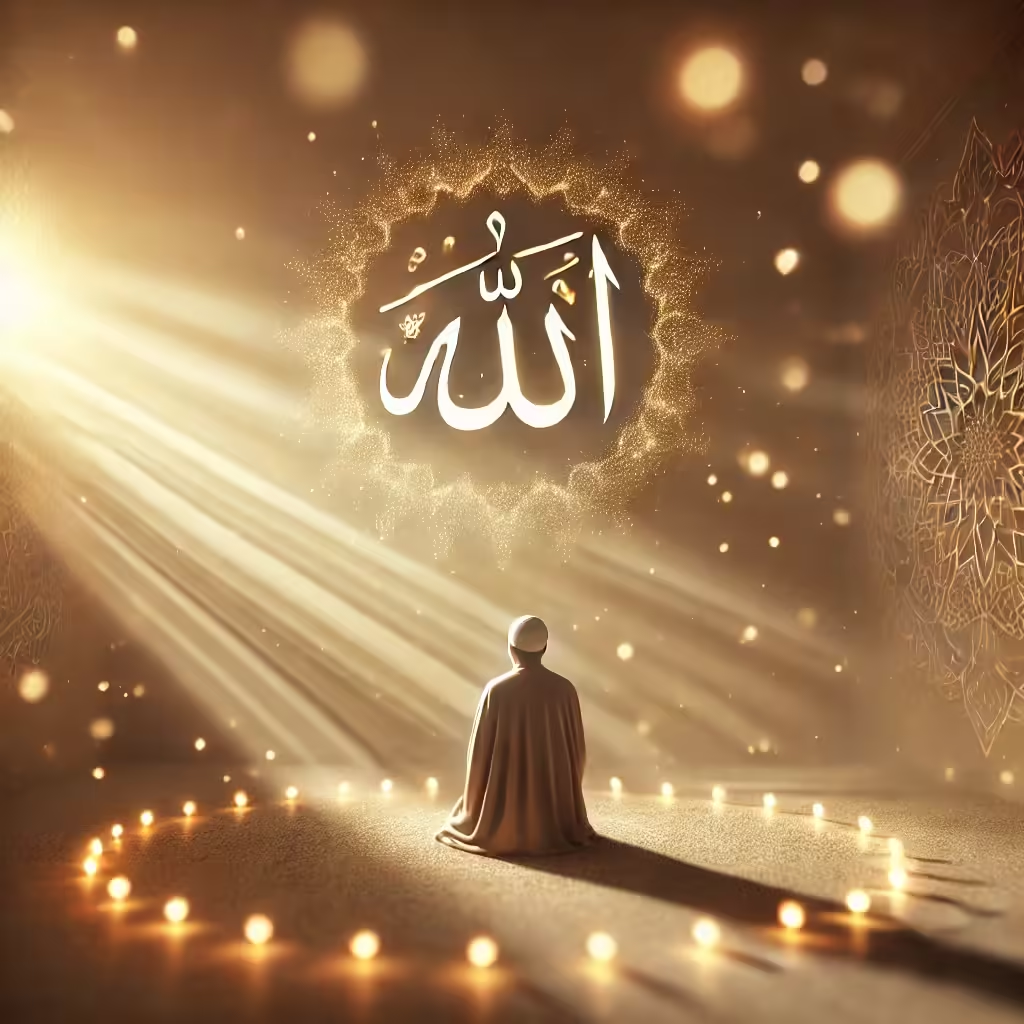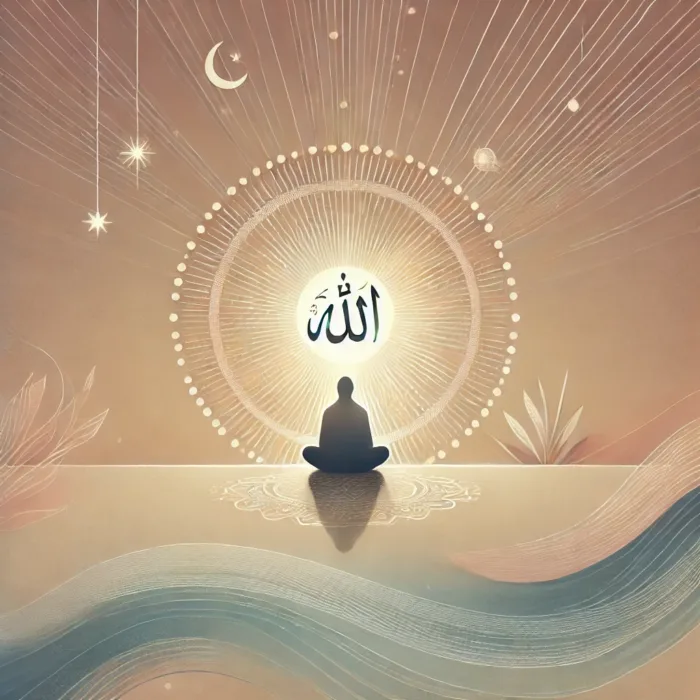Table of Contents
The Depth of True Monotheism and Knowing ALLAH
Whoever truly recognizes the greatness of ALLAH Almighty through knowledge will find love for HIM—this is the essence of monotheism. Why is religion fundamentally rooted in monotheism? Why did the Prophet (Peace and blessings be upon Him) dedicate thirteen years in Mecca solely to the call of monotheism? Most Islamic legislation was revealed during the Medina period. Out of the 23 years of the Islamic mission, the Prophet (Peace be upon Him) spent 13 years in Mecca and 10 years in Medina, with over half this time committed to embedding the principles of monotheism among the people.
Even alcohol was not prohibited during the Meccan period; it remained permissible for 13 years until after the Hijrah (migration) to Medina. In fact, many obligations were only established following this migration. Numerous legislations were reserved for the Medina phase. Thus, 13 years of the Prophet’s life and the history of the Quran were devoted to establishing and firmly planting monotheism in people’s hearts.
The issue goes beyond merely acknowledging that ALLAH is One. While this understanding is vital and foundational, it is not enough to grasp it only with the mind; we must also feel it profoundly. This deep, heartfelt connection is what has diminished in people’s hearts today. The testimony “There is no god but ALLAH” encompasses both understanding and a profound sensation, yet it is this inner feeling that has waned.
Today, many people can recite and explain the testimony, but some may still neglect prayer entirely. Why is that? Their hearts are unwell; they haven’t savored the essence, the taste, or the sweetness of faith. They haven’t truly experienced the reality of “There is no god but ALLAH“, and they won’t until they genuinely come to know ALLAH. Truly knowing ALLAH calls us to reflect upon HIS blessings within ourselves and throughout the universe, to ponder the beauty of Most Beautiful Names of ALLAH.
Knowing ALLAH Through Beautiful Names of ALLAH and Boundless Mercy
ALLAH Almighty has revealed HIMSELF through HIS Book and the teachings of HIS Messenger (Peace be upon Him). Among the most profound ways to know ALLAH are the Most Beautiful Names of ALLAH:
“And to ALLAH belong the Best Names, so invoke HIM by them“1
(Suraat ‘Al-‘Acraaf, 7:180)
These beautiful names hold immense significance in Islamic belief, representing HIS essential attributes, through which we come to appreciate HIS true worth.
The light of these names continues to bestow countless blessings upon people. The sick turn to ALLAH Ash-Shaafee (The Healer); the hungry seek ALLAH Al-Ghaniyy (The Rich) and Ar-Razzaq (The Provider); those in hardship call upon Ar-Rahmaan Ar-Rahiim (The Most Compassionate and the Most Merciful), in every trial they face. Through HIS attributes and names, HE grants boundless blessings to humanity.
When you realize that every detail of this universe, whether vast or minute, exists solely by ALLAH’s will—that nothing in the heavens or the earth, across endless realms and spaces, can exist independently—you come to understand that everything is sustained by ALLAH. HE creates and maintains all things; HE is Al-Qayyum (The All-Sustaining). HE holds all in place, preventing anything from slipping into chaos or perishing. HE “raised the heavens without pillars“2, keeping everything secure from vanishing or disruption.
Blessings flow from HIM to people—goodness, grace, and countless virtues. HE bestows these out of HIS love, kindness, and mercy toward HIS servants. HE feeds us with care, gives us drink with care, and nurtures us.
The Infinite Care and Affection of ALLAH, Al-Waduud
ALLAH has the highest example—HIS care surpasses even that of a mother for her newborn. A mother cares deeply for her infant, nurturing and protecting him with joyful vigilance because of his vulnerability, ensuring that no harm touches him. Parents care for their child with profound love; that is the essence of true ‘care’.
ALLAH is more caring for HIS servants than a mother for her child. HE provides sustenance out of care. HE causes the sun to rise over us in HIS care; without HIS will, it would not shine. HE brings it to set, and HE spins the earth on its axis and around the sun so that fruits may ripen for us—all out of care. Even the trials we face come under HIS watchful care. ALLAH is Loving, and this is reflected in one of His Most Beautiful Names: ‘Al-Waduud‘ (The Affectionate).

‘Al-Waduud’ is an intensive form of ‘wud‘ (affection). Scholars describe ‘wud‘ as pure, distilled love—the very essence of love itself. ALLAH is ‘Al-Waduud’ because, no matter how many sins a person may have, even if those sins fill the earth or reach the clouds of the sky—layer upon layer of darkness—if one meets HIM on the Day of Judgment without associating anything with HIM, HE may forgive them if HE wills, saying, ‘without concern‘3.
This is ALLAH, the Loving, who is deeply affectionate toward HIS servants, caring for them with boundless compassion.
The Beauty of Most Beautiful Names of ALLAH: Pathways to Faith and Tranquility
A wise believer understands that true beauty inspires love, and ALLAH is the epitome of beauty. We perceive and feel HIS beauty through HIS very essence because HE bestows this beauty upon HIS servants. How does this happen? Through HIS Most Beautiful Names, known as ‘Al-Asma ul-Husna‘. The term ‘Husna‘ is a superlative in Arabic, signifying the pinnacle of beauty. Indeed, ALLAH’s names are beautifully perfect. So how does one perceive ALLAH’s beauty through these names?
The Most Beautiful Names of ALLAH are pathways for people to reach HIM. If someone seeks to worship ALLAH and taste the sweetness of faith, they approach HIM through these names—through humility, reverence, and supplication: so invoke HIM by them’4. When you are ill, you turn to Ash-Shaafee (The Healer) and find comfort. When in need, you seek Al-Ghaniyy (The Rich) and feel relieved. When hungry, you call upon Ar-Razzaq Dzul Quwwatil Matiin (The All-Provider, Owner of Power, the Most Strong) and are satisfied:
“Verily, ALLAH is the All-Provider, Owner of Power, the Most Strong“5
(Suraat ‘Adh-Dhaariyaat, 51:58)
When you are afraid, you seek Al-Qahhaar (The Subduer) and Al-Jabbaar (The Omnipotent), and HE protects you. All of Most Beautiful Names of ALLAH bring security, peace, and tranquility to the hearts of those who worship HIM with humility and sincerity, without altering or changing HIS attributes.
Witnessing Divine Beauty Through Most Beautiful Names of ALLAH
A believer seeking to understand divine beauty must reflect upon and witness that beauty—to ‘worship ALLAH as if you see HIM‘6. This is an emotional and spiritual witnessing achieved by meditating on the Most Beautiful Names of ALLAH and HIS Exalted Attributes. As mentioned before, the beauty of the names of ALLAH is boundless. They are known as ‘Al-Husna‘—the absolutely beautiful—without limitation or restriction, extending infinitely into the unseen.
When we contemplate these names in our worship, even those that signify majesty and grandeur, we come to understand their beauty. For example, it’s easy to see why Ar-Rahmaan (The Most Compassionate) is among the Most Beautiful Names of ALLAH, as it reflects mercy, a beautiful attribute. Ar-Rahiim (The Most Merciful), Al-Ghafuur (The Ever-Forgiving), Al-Waduud (The Affectionate)—these names express pure, unadulterated love. When ALLAH loves a servant, He grants them a special affection that surpasses ordinary love; it is the pinnacle of love. ALLAH is Al-Waduud, and these names beautifully reveal HIS nature.
Sometimes, however, people may find it challenging to recognize the beauty in names like Al-Qahhaar (The Subduer), Al-Jabbaar (The Omnipotent), and Al-Mutakabbir (The Justly Proud). This difficulty often stems from the mistake of comparing ALLAH’s attributes to human traits, which is a fundamental misunderstanding. We should not equate ALLAH’s mercy with human mercy or HIS generosity with human generosity. When we make such comparisons, we risk misinterpreting names like Al-Qahhaar and Al-Jabbaar. For example, while arrogance is a negative trait in humans, when ALLAH is described as Al-Mutakabbir (The Justly Proud), it is a name of the highest beauty.
The Futility of Human Arrogance: Recognizing ALLAH’s Exclusive Supremacy
ALLAH has reserved certain attributes exclusively for HIMSELF, such as supremacy and grandeur. HE has forbidden people from being arrogant on earth:
“Honour is MY Izar and Pride is MY Cloak. Whoever vies with ME regarding one of them, shall be tormented”7
When we encounter arrogance in someone, we recognize that they are falsely elevating themselves. All humans are servants and inherently weak. As early spiritual scholars noted, and as Rabi’a al-Adawiyya is often attributed to saying:
“All that is upon the dust is dust“
This statement reminds us that every arrogant person is merely dust that dissolves at the touch of water—symbolic of death. So, with what right does a servant boast over others? We are all equal:
“An Arab has no virtue over a Non Arab, nor does a Non Arab have virtue over an Arab, a red skinned person is not more virtuous than a dark skinned person nor is a dark skinned person more virtuous than a red skinned person except through Taqwah”8
The truly pious do not display arrogance:
“He who has, in his heart, an ant’s weight of arrogance will not enter Jannah”9
Arrogance reflects a deficiency in one’s character—a sign of an internal struggle and perceived weakness. Such a person deserves compassion. When you see someone acting arrogantly, feel compassion for them; they are suffering within and retreating into arrogance as a form of defense.
Human arrogance is nothing more than a facade—a lie, like a paper tiger. Would anyone fear a paper tiger? The arrogant person is essentially deceiving themselves and others. We understand this because ALLAH alone is truly Al-Mutakabbir (The Justly Proud). Since HE has claimed this attribute exclusively, any human claiming it is acting falsely and is in need of psychological support and compassion. Recognizing this brings a sense of peace; no one can genuinely hold arrogance over you. Instead of feeling burdened by their arrogance, you find yourself in a healthier state of mind, feeling empathy for them and perhaps even offering kind words or gentle advice.

Understanding that the attribute they misuse is actually reserved for the Creator helps you stay grounded. How can a servant be arrogant when supremacy belongs solely to ALLAH, Al-Waahid (The Uniquely One), Al-Qahhaar (The Subduer)?
Finding Peace in ALLAH’s Supremacy and Understanding the Nature of Tyranny
Therefore, ALLAH’s name Al-Mutakabbir (The Justly Proud) is beautiful and among the Most Beautiful Names of ALLAH because it brings peace and security to the heart. Reflecting on this name, you find your heart at ease. The same is true for Al-Jabbaar (The Omnipotent). When faced with tyranny—whether from a modern-day Pharaoh or any oppressive figure—you recognize that they are also afflicted and in need of healing. Pharaoh, in his confrontation with Moses (Peace be upon Him), masked his cowardice and weakness with a facade of arrogance and tyranny. He claimed divinity, “Saying: “I am your lord, most high””10, yet he was well aware of his own vulnerabilities.
Tyranny often conceals fear and insecurity. It’s said, “The stone of the fearful is large”, meaning that oppressive actions are like stones thrown by those who are afraid. Truly secure and balanced individuals do not resort to arrogance or tyranny, for they understand that true power and might belong solely to ALLAH. This realization brings comfort and reassurance that nothing meant to miss you will reach you, and nothing meant to reach you will miss you. Any harm that comes your way is by ALLAH’s decree.
This understanding is echoed in the stories and teachings of the Holy Quran and the Hadiths of the Prophet Muhammad (Peace be upon Him), which emphasize placing trust in ALLAH’s plan. By internalizing these truths, a person finds deep peace and security within their heart.
A Lesson in Trust and Tranquility: The Profound Wisdom of the Prophet’s Advice to Ibn Abbas
The narration of “O boy”, “O lad” as reported by Ibn Abbas, may ALLAH be pleased with them both, tells us that Ibn Abbas was a small child when the Prophet (Peace and blessings be upon him), brought him to ride behind Him on a mount. Speaking to him with affection and closeness, He said, “O boy! I will instruct you in some matters”—small phrases filled with deep meanings:
“Be watchful of ALLAH (Commandments of ALLAH), HE will preserve you. Safeguard HIS Rights, HE will be ever with you. If you beg, beg of HIM Alone; and if you need assistance, supplicate to ALLAH Alone for help. And remember that if all the people gather to benefit you, they will not be able to benefit you except that which ALLAH had foreordained (for you); and if all of them gather to do harm to you, they will not be able to afflict you with anything other than that which ALLAH had pre-destined against you. The pens had been lifted and the ink had dried up”11
This brings a person a peace and tranquility that only a true believer can experience.
Those who lack security and peace in their hearts, who have lost the sense of these beautiful meanings gifted by the Quran and Prophetic traditions—meanings as refreshing as cool water on a scorching summer day—often feel the need to display their strength, power, and might. The believer, on the other hand, draws beauty and comfort from ALLAH’s majesty. Where do these meanings come from? From ALLAH’s grandeur, from HIS being Al-Jabbaar and Al-Qahhaar.
The Blessing of Servitude to The Most Beautiful Names of ALLAH
Hence, among the finest names to give your child are those that reflect servitude to ALLAH, such as Abdul-Jabbaar (Servant of The Omnipotent). Whoever is a servant to the Omnipotent is safeguarded from people’s tyranny. Whoever serves Al-Qahhaar (The Subduer) is protected from being overpowered by others. Whoever is devoted to Ar-Razzaaq (The Provider) is secure from reliance on others, for they are assured that their provision comes from Almighty ALLAH.
Every believer is a servant to ALLAH through all HIS names and attributes. When someone names themselves as a servant of one of Most Beautiful Names of ALLAH—like Abdul-LAH (Servant of ALLAH) or Abdur-Rahmaan (Servant of The Most Compassionate)—they benefit from the blessings that come with each of these divine names.

Do not think that as Abdur-Rahmaan, you will not receive the divine support connected with the attributes of Ar-Razzaaq or Al-Jabbaar simply because you identify as Abdur-Rahmaan. The Most Beautiful Names of ALLAH and HIS Exalted Attributes are linked to HIS very essence, as established by the scholars of creed in authentic traditions, upheld without negation or misinterpretation, as it has been said, and as we affirm.
A Journey to Inner Peace and Love through Most Beautiful Names of ALLAH
Our goal goes beyond mere formalities; it is to experience the profound, transformative effects of this beautiful creed. This requires a deep understanding that enables the believer to seek and savor the beauty within ALLAH’s divine names and attributes. I mentioned that the Most Beautiful Names of ALLAH are indivisible; they cannot be separated from one another. Glory be to ALLAH above that! HIS essence is one, while HIS names are many—multiple names for one God. When you worship Ar-Rahmaan, you also receive the light of Al-Jabbaar, Al-Qahhaar, Ar-Razzaaq, and all HIS names. Whichever door you knock upon, you find all goodness with ALLAH the Almighty.
Thus, the believer who wishes to taste the meanings of love approaches monotheism through the Most Beautiful Names of ALLAH, seeking the beauty within them. Do not stop at the letters and words without tasting their sweetness. Live with ALLAH Almighty through the lights of HIS names and the beauty of HIS attributes. Be HIS servant in all of this. Worship HIM as Ar-Rahmaan, worship HIM as Ar-Rahiim, worship HIM as Al-Malik (The Sovereign), as Al-Qudduus (The Holy/Pure), as As-Salaam (The Most Safe), as Al-Mu’min (The Grantor of Security), as Al-Muhaymin (The Overseer), and through all HIS names and attributes.
Feel this in your heart. Let yourself journey to ALLAH through all these lights, each one leading to the same, singular Lord without partner, exalted is HE. You will find tranquility in your heart from all directions—be it illness, fear, provision, or any matter of this life and the hereafter. Your heart will find assurance in them, and you will feel beauty, peace, and love. You will become a true lover of ALLAH Almighty.
It is with purpose and wisdom that ALLAH mentions in the Quran:
“…yet those who have attained faith are stronger in love for ALLAH“12
(Suraat ‘Al-Baqarah, 2:165)
Source:
- Sheikh Dr. Farid El Ansari. جمال اسماء الله الحسنى د فريد الأنصاري رحمه الله. YouTube Video.
- Saheeh International translation ↩︎
- (Suraat ‘Ar-Racd, 13:2) – Dr. Mustafa Khattab, the Clear Quran ↩︎
- Sunan at-Tirmidhi ↩︎
- Saheeh International translation ↩︎
- Muhammad Taqi-ud-Din al-Hilali & Muhammad Muhsin Khan ↩︎
- Sahih al-Bukhari ↩︎
- Sahih Muslim ↩︎
- Musnad Ahmad ↩︎
- Sahih Muslim ↩︎
- Muhammad Taqi-ud-Din al-Hilali & Muhammad Muhsin Khan ↩︎
- Sunan at-Tirmidhi ↩︎
- Fadel Soliman, Bridges’ translation ↩︎

